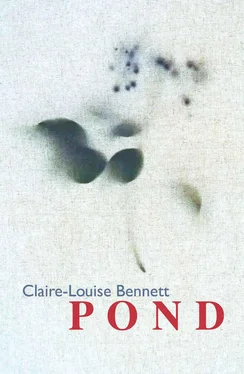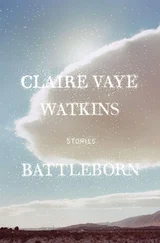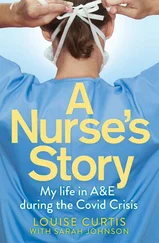She is not on her own entirely — straight away in fact she encounters an animal which I took to be a cat for a long time until something was said about the creature which clearly indicated it was in fact a dog. I don’t know how it was I came to make such an elementary mistake in the first place, never mind how I managed to maintain my misconception for quite so long, for several pages in fact, because when I looked back over those pages after my error had been exposed they offered such a tactile inventory of the animal’s behaviour, attitudes and movements; characteristic details that are not at all in keeping with those one would typically associate with a cat. I’d been very engrossed with the book right from the start so it rather puzzled me that I’d slipped up like this and the only way I could account for it was to blame the animal’s name, which was Lynx, which, as everybody knows, is a medium-sized species of wildcat. Well, it’s no wonder, I thought, it’s no wonder I took the creature to be a cat, with a name like that! But really, this explanation, reasonable as it is, did nothing to stymie my embarrassment since it implied my mind must be really quite feeble and literal that a mischievous bit of nomenclature managed to override pages of meticulous and animated description and impel such an unforgivable misreading. At the same time, one needs to be careful with names. Names in books are nearly always names from real life and so already the reader is bound to have some knowledge about a person with a particular name such as Miriam and even if that reader’s mind is robust and adaptable some little thing about Miriam in real life will infiltrate Miriam in the book so that it doesn’t matter how many times her ear lobes are referred to as dainty and girlish in the reader’s mind Miriam’s ear lobes are forever florid and pendulous. It is very difficult, I should think, to make up a person and have everyone reassemble him or her in just the way intended, without anything intervening, and sometimes, as I read, the pressure exerted by so much emphatic character exposition and plotted human endeavour becomes stifling and I have the horrible encroaching sensation that I’m getting everything all wrong or that I’m absolutely oblivious to something fairly accessible and very profound.
Needless to say since this particular novel is in fact the journal of the last person alive there are no other human characters in the book, which was a real treat, and I found it peculiar that somewhere on the sleeve, someone, an esteemed critic I gather, had described the book as dystopian fiction because it’s not as if the woman’s circumstances are portrayed apocalyptically and overall she does not suffer a great deal. That’s not to say her predicament is construed romantically or becomes rarefied and nauseatingly didactic, not at all; this is very much a book about survival, and the grievous psychological ramifications and gruelling practical exigencies occasioned by confinement in this recently depopulated environment are in fact delineated with acuity and care. However, the profound existential and cosmological repercussions precipitated by such extraordinary isolation are also beautifully charted and it is quite impossible to stop reading because in a sense you want to go where she is going; you want to be undone in just the way she is being undone. Indeed, it is like a last daydream from childhood in many ways because hopefully the world for a child is mostly sticks and mountains and huge lone birds and as such almost all of childhood is taken up hopefully with just these kinds of boundless fantasies of danger and solitude.
Towards the first winter she has a cold for a few days and it really knocks the stuffing out of her. And when she is beginning to fill out again and feeling more like herself she takes a look in the mirror, which is quite a normal thing to do when one has been ill because there is a need to see if, in addition to feeling restored, one is also beginning to look like oneself again. However, it has been some time since she has looked in the mirror and so she doesn’t quite know how to relate to or interpret the reflection she sees — it’s as if she just can’t work out what she’s supposed to be looking at. Because there are no other human faces her own face has no currency and it doesn’t seem to express any of the customary hallmarks and it’s difficult for her to pinpoint anything in it that is familiar. Then, just as all this is beginning to freak her out, she realises that all the categories by which she has hitherto identified herself are now perfectly redundant. She is not a woman, though neither of course is she a man; she is more like an element. A physiological manifestation perhaps, in the same way the rocks and trees are physiological manifestations. Material. Matter. Stuff. For a few moments I looked away from the pages so that there was some opportunity for me to feel a little of what she must have felt when she looked at her face with the same sort of attention one brings to bear upon the bark of a tree, the surface of a rock, the skin of a peach, and in those few moments it was as if the pupils in my own eyes became tunnels and I was suddenly sucked backwards.
Of course, although she had outstripped ordinary ontological designations she had not completely transcended terrestrial binds — her life still depended upon the provision of warmth and nourishment and so practically all of her time was taken up with essential tasks like chopping wood, planting potatoes, milking the cow, repairing broken places and things, haymaking, finding berries — those kinds of tasks — and at some point I thought perhaps everything would be absolutely fine and she would just keep going. But this idea was only a brief fantasy really because in fact all the things she relied upon were finite and once they expired there would be no way of replacing or substituting them. Once all the bullets had been spent there would be no more deer meat, once the cow had died there would be no more milk and butter, once the candles were gone there would be no more light, and, once the matches were all burnt out, well there would be nothing really. And that is why she sat down with the remaining boxes, one afternoon, and counted all the matches out, carefully, one by one.
Paper, too, was also in limited supply, and in fact it seems she ran out of paper before any of the aforementioned necessities were used up and so the record of her experience ends before things get really severe and insurmountable for her. I think it rather shrewd of the author to leave a question over the precise circumstances of the woman’s dying for the reason that it seems to me the woman’s death wouldn’t just have been about starving from hunger or freezing from cold, that probably it was about something much more, which cannot very well be put into such straightforward equations. Since her death is not dealt with in the book the only place it can occur is in my head, and I feel as though something is still haunting me or even that I am still haunting something, which means the book carries on beyond where it ends, and no doubt this was the author’s absolute wish. It makes sense to suppose that since the underpinning of her existence had been totally reconfigured then death too would itself be an unexampled event; this was the proposition that slowly turned over and over in my thoughts as I stood on one leg in the bathroom yesterday evening, neatly clipping toenails into the sink. What exactly, I wondered, would death entail for her and how on earth could anyone even try to represent it? The walls and mirrors and the window were wet with condensation, and I was feeling really pampered and refreshed and quite safe when the images began to arrive. First of all I saw her melting quickly like the snow in cartoons, and then I saw her snapped up by the air and propelled as vapour fast through the spaces between the evergreen trees, then I heard her take a breath and hold it until it blasted her into little lines of fractured hoarfrost, then I heard her lie down on the real snow and the snow creaked and the blood that progressed through it shone red all around her settled body, then I saw the crows rise up from out the highest branches and the deer lifted their chins and their eyes were completely black. I turned on the cold tap and watched the water swish away my surplus and I opened the window and didn’t move. If we have lost the knack of living, I thought, it is a safe bet to presume we have forfeited the magic of dying.
Читать дальше












